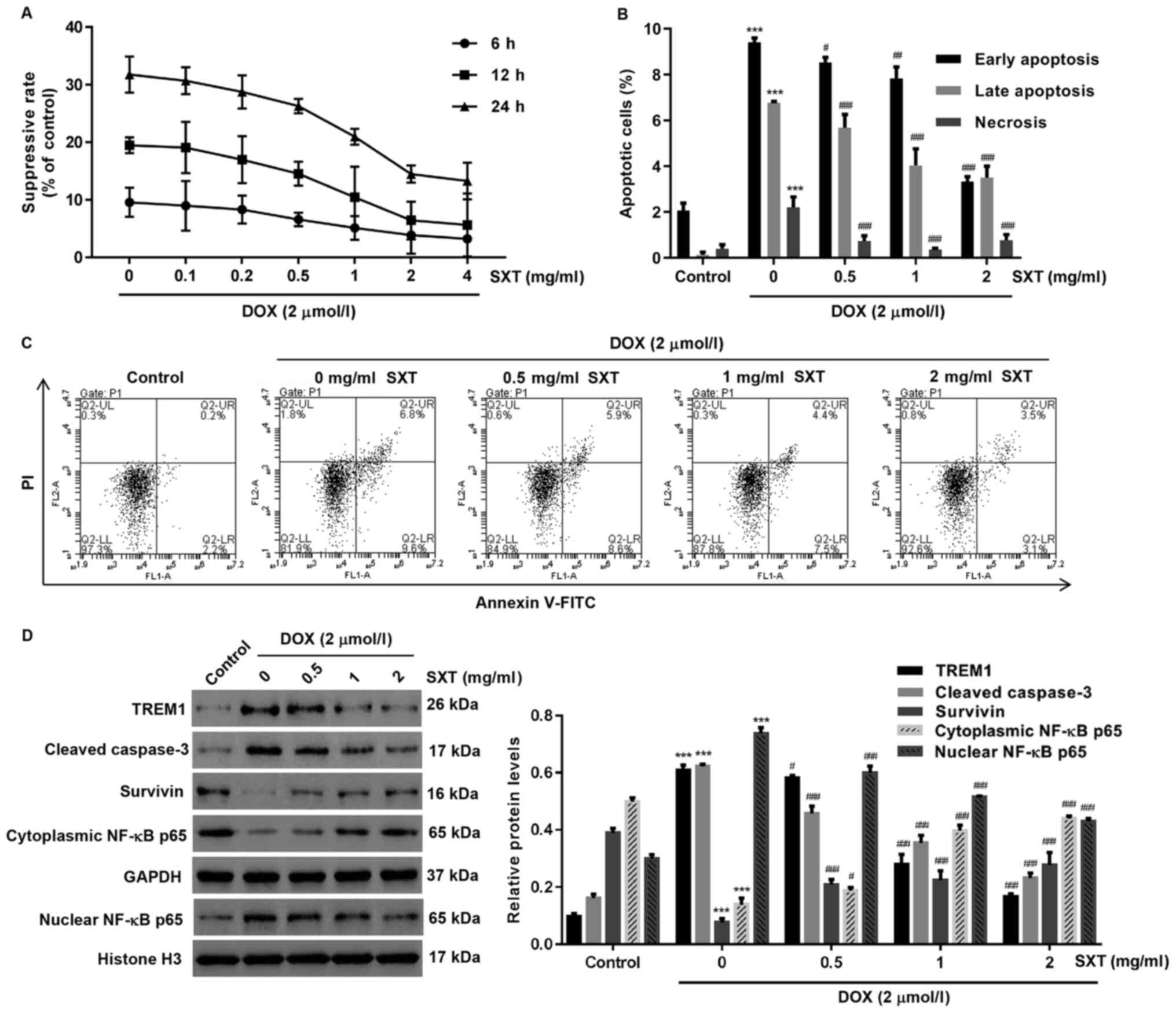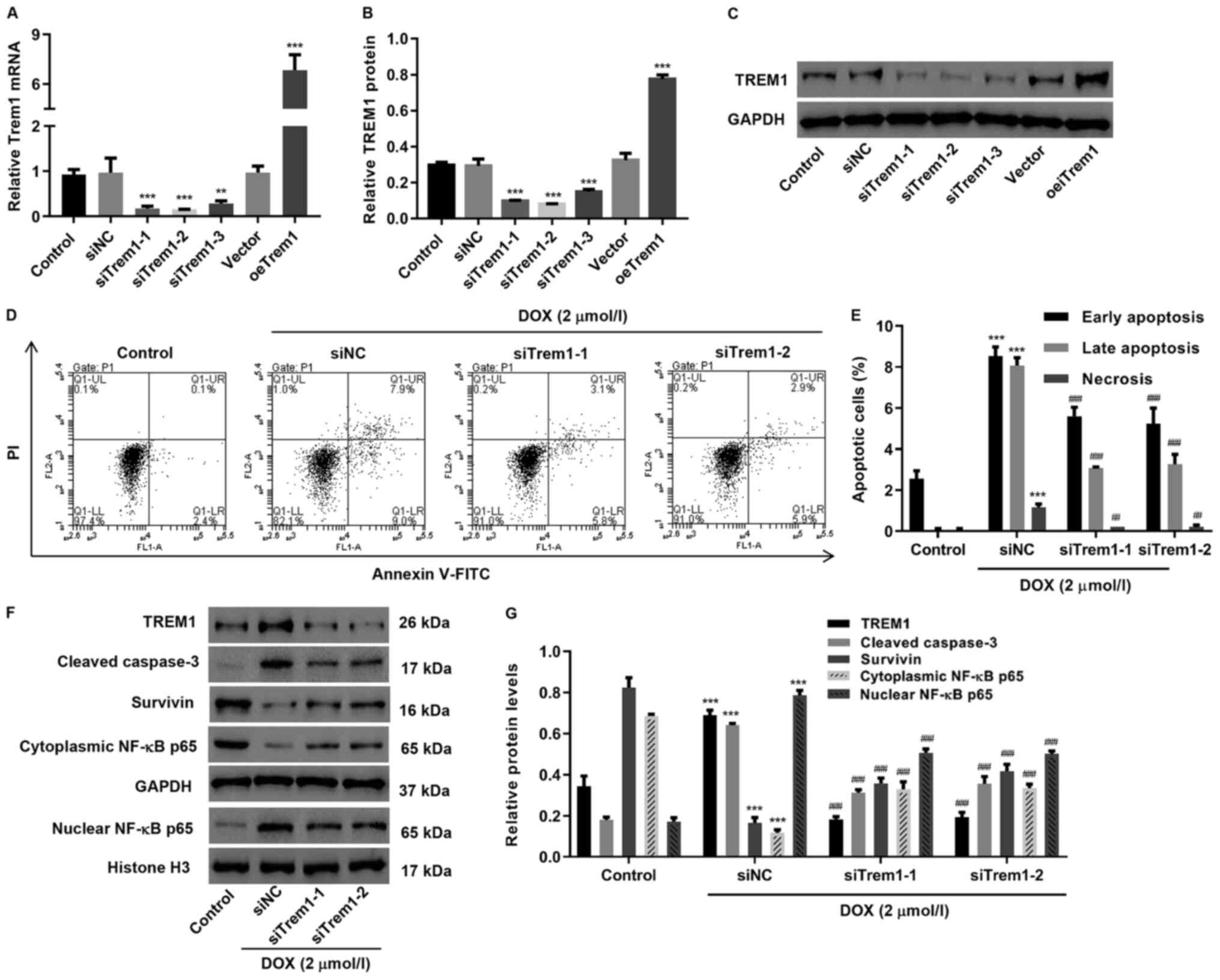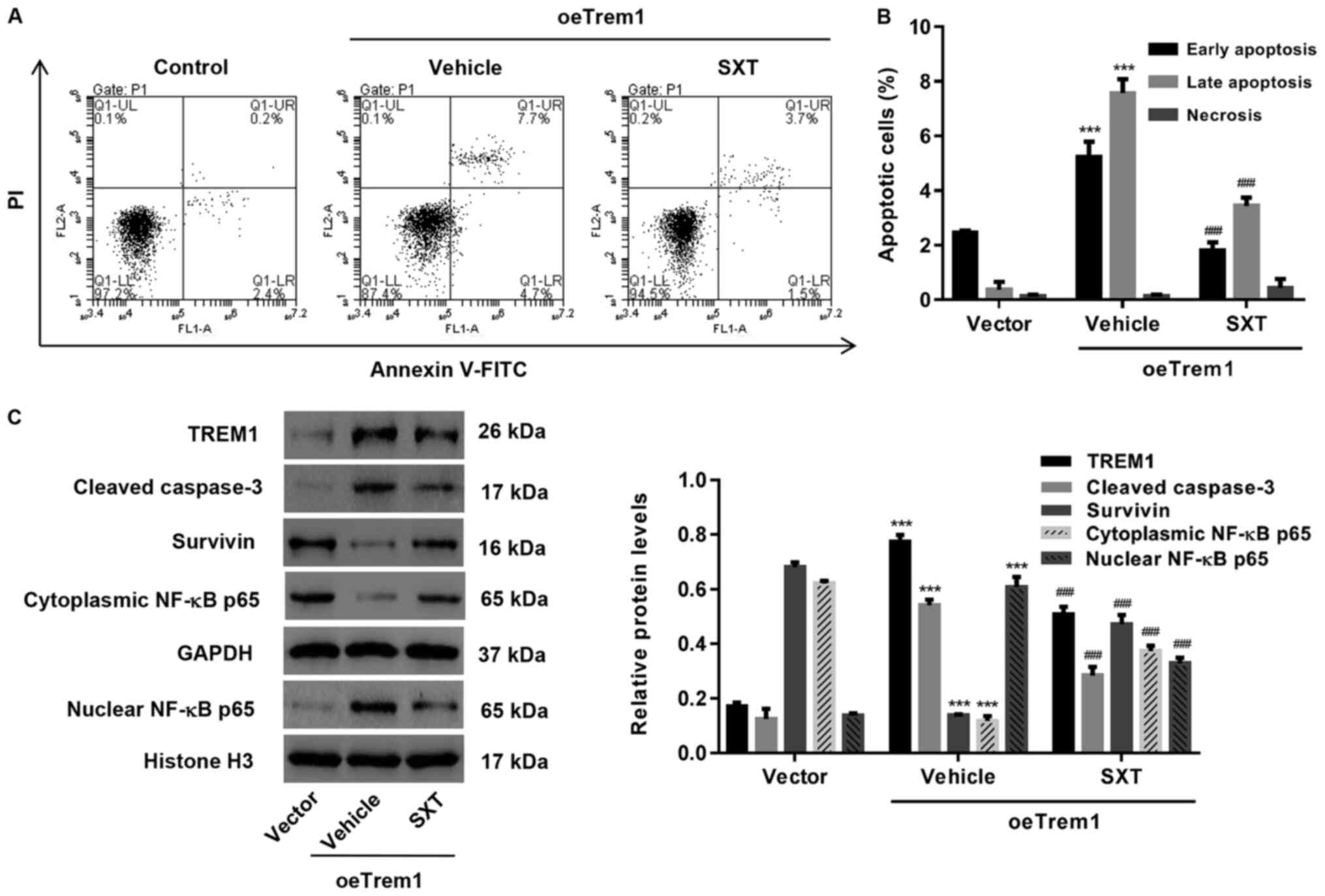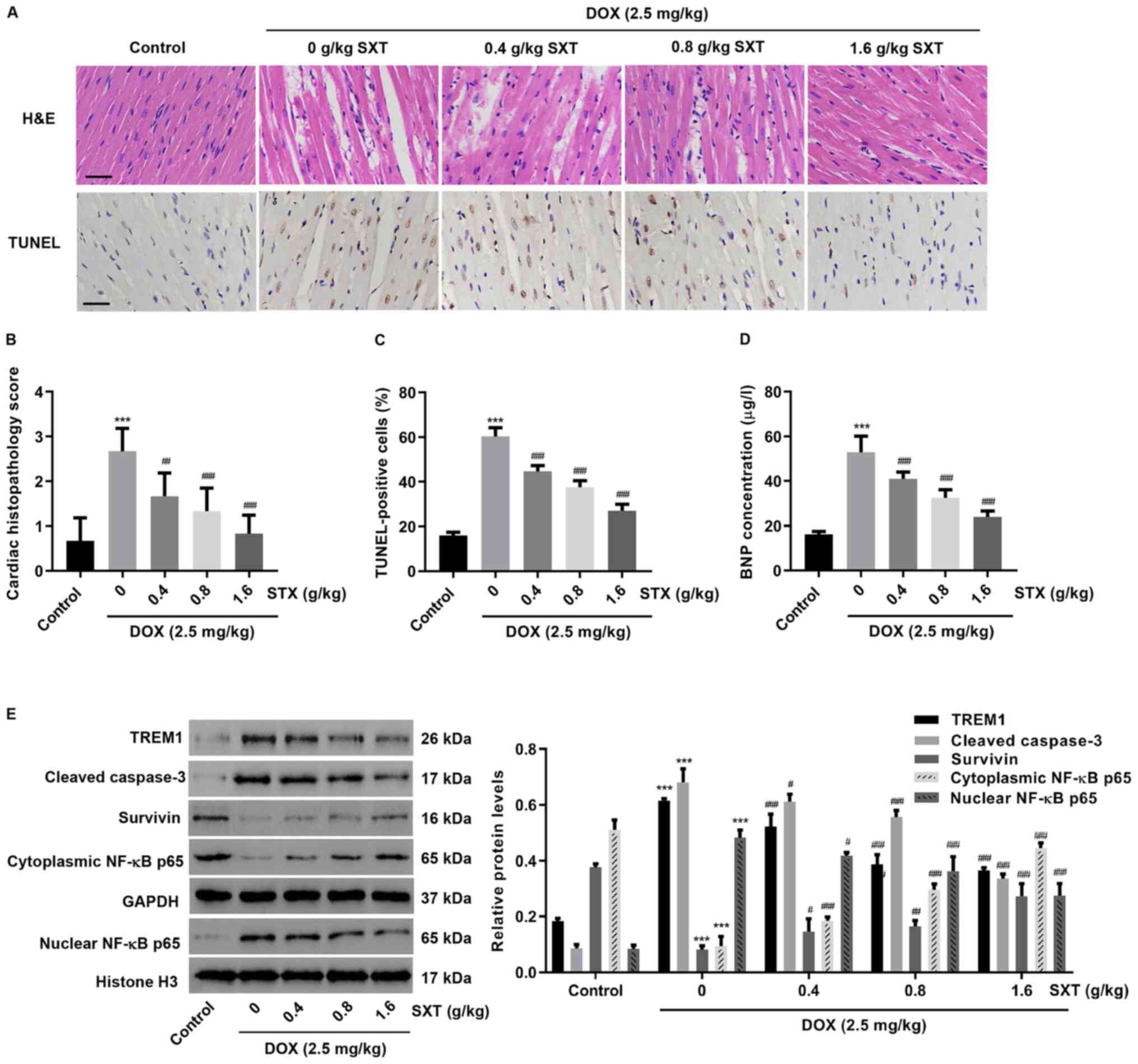|
1
|
Rivankar S: An overview of doxorubicin
formulations in cancer therapy. J Cancer Res Ther. 10:853–858.
2014. View Article : Google Scholar : PubMed/NCBI
|
|
2
|
Zhang Y, Yang C, Wang W, Liu J, Liu Q,
Huang F, Chu L, Gao H, Li C, Kong D, et al: Co-delivery of
doxorubicin and curcumin by pH-sensitive prodrug nanoparticle for
combination therapy of cancer. Sci Reps. 6:212252016. View Article : Google Scholar
|
|
3
|
Kalyanaraman B: Teaching the basics of the
mechanism of doxorubicin-induced cardiotoxicity: Have we been
barking up the wrong tree? Redox Biol. 29:1013942019. View Article : Google Scholar : PubMed/NCBI
|
|
4
|
Hu X, Liu H, Wang Z, Hu Z and Li L:
miR-200a attenuated doxorubicin-induced cardiotoxicity through
upregulation of Nrf2 in Mice. Oxid Med Cell Longev.
2019:15123262019. View Article : Google Scholar : PubMed/NCBI
|
|
5
|
Yerebakan C, Boltze J, Elmontaser H,
Yoruker U, Latus H, Khalil M, Ostermayer S, Steinbrenner B, Apitz
C, Schneider M, et al: Effects of pulmonary artery banding in
doxorubicin-induced left ventricular cardiomyopathy. J Thorac
Cardiovasc Surg. 157:2416–2428.e4. 2019. View Article : Google Scholar : PubMed/NCBI
|
|
6
|
Azamthulla M, Mukherjee D, Roy J and
Ravishankar C: Evaluation of cardiomyocyte targeted novel
nano-formulation of pirfenidone on doxorubicin induced congestive
heart failure in rats. Conference on Drug Design and Discovery
Technologies. 212–218. 2019. View Article : Google Scholar
|
|
7
|
Zhang DX, Ma DY, Yao ZQ, Fu CY, Shi YX,
Wang QL and Tang QQ: ERK1/2/p53 and NF-κB dependent-PUMA activation
involves in doxorubicin-induced cardiomyocyte apoptosis. Eur Rev
Med Pharmacol Sci. 20:2435–2442. 2016.PubMed/NCBI
|
|
8
|
Imam F, Al-Harbi NO, Al-Harbi MM, Ansari
MA, Al-Asmari AF, Ansari MN, Al-Anazi WA, Bahashwan S, Almutairi
MM, Alshammari M, et al: Apremilast prevent doxorubicin-induced
apoptosis and inflammation in heart through inhibition of oxidative
stress mediated activation of NF-κB signaling pathways. Pharmacol
Rep. 70:993–1000. 2018. View Article : Google Scholar : PubMed/NCBI
|
|
9
|
Kang HY, Zhang FH, Liu XM and Yu W:
Preliminary research of the effects of Shengxian decoction in rats
acute anoxemia of cardiac muscle. Chin J Hos Phar. 27:6172007.
|
|
10
|
Gu HR, Zhou MX and Liu QC: Experience of
GU Wei-chao in treating heart and lung diseases through application
of modified shengxian decoction. Chin J Inform Traditional Chin
Med. 25:108–110. 2018.
|
|
11
|
Gao YH and Zheng Y: Effect of modified
shengxian decoction on treating cerebral watershed infarctionion.
Chin Arch Traditional Chin Med. 812012.
|
|
12
|
Junyao X, Zhu J, Cheng Y, Wu ZY, Chen YD,
Xia BM and Wu HX: Research on immune mechanism of Shengxian
decoction in experimental autoimmune myasthenia gravis rats. Chin J
Immunol. 32:1462–1466. 2016.(In Chinese).
|
|
13
|
Guangshan L, Ren Z, Zheng Y, Huang D and
Mingdi L: Clinical observation on 32 cases of hypothyroidism of
thyroid cancer after operation treated with Shengxian decoction
combined with levothyroxine sodium tablets. Int J Traditional Chin
Med. 35:692–694. 2013.
|
|
14
|
Zhang L, Xiong Y and Wang Z: Study on
interference of miao medicine sheng xian decoction on protein
expression of brain-derived neuro-trophic factor in the sacral
spinal cord of rats with cauda equina injury. J Med Postgraduates.
1042–1046. 2014.
|
|
15
|
Zhang F, Zhan Q, Dong X, Jiang B, Sun L,
Gao S, He Z, Tao X and Chen W: Shengxian decoction in chronic heart
failure treatment and synergistic property of Platycodonis Radix: A
metabolomic approach and its application. Mol Biosyst.
10:2055–2063. 2014. View Article : Google Scholar : PubMed/NCBI
|
|
16
|
Kouassi KT, Gunasekar P, Agrawal DK and
Jadhav GP: TREM-1; Is it a pivotal target for cardiovascular
diseases? J Cardiovasc Dev Dis. 5:452018. View Article : Google Scholar
|
|
17
|
Campbell GR, To RK and Spector SA: TREM-1
protects HIV-1-infected macrophages from apoptosis through
maintenance of mitochondrial function. mBio. 10:e02638–19. 2019.
View Article : Google Scholar : PubMed/NCBI
|
|
18
|
Tang J and Dong Q: Knockdown of TREM-1
suppresses IL-1β-induced chondrocyte injury via inhibiting the
NF-κB pathway. Biochem Biophys Res Commun. 482:1240–1245. 2017.
View Article : Google Scholar : PubMed/NCBI
|
|
19
|
Zhang F, Zhan Q, Gao S, Dong X, Jiang B,
Sun L, Tao X and Chen WS: Chemical profile- and
pharmacokinetics-based investigation of the synergistic property of
platycodonis radix in traditional Chinese medicine formula
Shengxian decoction. J Ethnopharmacol. 152:497–507. 2014.
View Article : Google Scholar : PubMed/NCBI
|
|
20
|
Xiong S, Zheng Y, Jiang P, Liu R, Liu X
and Chu Y: MicroRNA-7 inhibits the growth of human non-small cell
lung cancer A549 cells through targeting BCL-2. Int J Biol Sci.
7:805–814. 2011. View Article : Google Scholar : PubMed/NCBI
|
|
21
|
Livak KJ and Schmittgen TD: Analysis of
relative gene expression data using real-time quantitative PCR and
the 2(-Delta Delta C(T)) method. Methods. 25:402–408. 2001.
View Article : Google Scholar : PubMed/NCBI
|
|
22
|
Jansen CHP, Brangsch J, Reimann C, Adams
L, Hamm B, Botnar RM and Makowski MR: In vivo high-frequency
ultrasound for the characterization of thrombi associated with
aortic aneurysms in an experimental mouse model. Ultrasound Med
Biol. 43:2882–2890. 2017. View Article : Google Scholar : PubMed/NCBI
|
|
23
|
Devereux RB and Reichek N:
Echocardiographic determination of left ventricular mass in man.
Anatomic validation of the method. Circulation. 55:613–618. 1977.
View Article : Google Scholar : PubMed/NCBI
|
|
24
|
Wang X, Liu F, Xu M and Wu L:
Penehyclidine hydrochloride alleviates lipopolysaccharide-induced
acute respiratory distress syndrome in cells via regulating
autophagy-related pathway. Mol Med Rep. 23:1002021. View Article : Google Scholar : PubMed/NCBI
|
|
25
|
Hafez HM and Hassanein H: Montelukast
ameliorates doxorubicin-induced cardiotoxicity via modulation of
p-glycoprotein and inhibition of ROS-mediated TNF-α/NF-κB pathways.
Drug Chem Toxicol. 1–12. 2020.doi: 10.1080/01480545.2020.1730885
(Epub ahead of print). View Article : Google Scholar : PubMed/NCBI
|
|
26
|
Volkova M and Russell R III: Anthracycline
cardiotoxicity: Prevalence, pathogenesis and treatment. Curr
Cardiol Rev. 7:214–220. 2011. View Article : Google Scholar : PubMed/NCBI
|
|
27
|
Wang Y, Lei T, Yuan J, Wu Y, Shen X, Gao
J, Feng W and Lu Z: GCN2 deficiency ameliorates doxorubicin-induced
cardiotoxicity by decreasing cardiomyocyte apoptosis and myocardial
oxidative stress. Redox Biol. 17:25–34. 2018. View Article : Google Scholar : PubMed/NCBI
|
|
28
|
Polegato BF, Minicucci MF, Azevedo PS,
Carvalho RF, Chiuso-Minicucci F, Pereira EJ, Paiva SA, Zornoff LA,
Okoshi MP, Matsubara BB and Matsubara LS: Acute doxorubicin-induced
cardiotoxicity is associated with matrix metalloproteinase-2
alterations in rats. Cell Physiol Biochem. 35:1924–1933. 2015.
View Article : Google Scholar : PubMed/NCBI
|
|
29
|
Renu K, V G A, P B TP and Arunachalam S:
Molecular mechanism of doxorubicin-induced cardiomyopathy-An
update. Eur J Pharmacol. 818:241–253. 2018. View Article : Google Scholar : PubMed/NCBI
|
|
30
|
Ichikawa Y, Ghanefar M, Bayeva M, Wu R,
Khechaduri A, Naga Prasad SV, Mutharasan RK, Naik TJ and Ardehali
H: Cardiotoxicity of doxorubicin is mediated through mitochondrial
iron accumulation. J Clin Invest. 124:617–630. 2014. View Article : Google Scholar : PubMed/NCBI
|
|
31
|
Vejpongsa P and Yeh ET: Prevention of
anthracycline-induced cardiotoxicity: Challenges and opportunities.
J Am Coll Cardiol. 64:938–945. 2014. View Article : Google Scholar : PubMed/NCBI
|
|
32
|
Li J, Wu Y, Wang D, Zou L, Fu C, Zhang J
and Leung GP: Oridonin synergistically enhances the anti-tumor
efficacy of doxorubicin against aggressive breast cancer via
pro-apoptotic and anti-angiogenic effects. Pharmacol Res.
146:1043132019. View Article : Google Scholar : PubMed/NCBI
|
|
33
|
Ibrahim KM, Mantawy EM, Elanany MM,
Abdelgawad HS, Khalifa NM, Hussien RH, El-Agroudy NN and
El-Demerdash E: Protection from doxorubicin-induced nephrotoxicity
by clindamycin: Novel antioxidant, anti-inflammatory and
anti-apoptotic roles. Naunyn Schmiedebergs Arch Pharmacol.
393:739–748. 2020. View Article : Google Scholar : PubMed/NCBI
|
|
34
|
Zhao L and Zhang B: Doxorubicin induces
cardiotoxicity through upregulation of death receptors mediated
apoptosis in cardiomyocytes. Sci Repo. 7:447352017. View Article : Google Scholar
|
|
35
|
Yang J, Wang H, Xu W, Hao D, Du L, Zhao X
and Sun C: Metabolomic analysis of rat plasma following chronic
low-dose exposure to dichlorvos. Hum Exp Toxicol. 32:196–205. 2013.
View Article : Google Scholar : PubMed/NCBI
|
|
36
|
Marín-García J and Goldenthal MJ: Fatty
acid metabolism in cardiac failure: Biochemical, genetic and
cellular analysis. Cardiovasc Res. 54:516–527. 2002. View Article : Google Scholar : PubMed/NCBI
|
|
37
|
Yuan Z, Syed MA, Panchal D, Joo M, Colonna
M, Brantly M and Sadikot RT: Triggering receptor expressed on
myeloid cells 1 (TREM-1)-mediated Bcl-2 induction prolongs
macrophage survival. J Biol Chem. 289:15118–15129. 2014. View Article : Google Scholar : PubMed/NCBI
|
|
38
|
Liu F, Zhang X, Zhang B, Mao W, Liu T, Sun
M and Wu Y: TREM1: A positive regulator for inflammatory response
via NF-κB pathway in A549 cells infected with Mycoplasma
pneumoniae. Biomed Pharmacother. 107:1466–1472. 2018. View Article : Google Scholar : PubMed/NCBI
|
|
39
|
Raninga PV, Di Trapani G, Vuckovic S and
Tonissen KF: TrxR1 inhibition overcomes both hypoxia-induced and
acquired bortezomib resistance in multiple myeloma through NF-κβ
inhibition. Cell Cycle. 15:559–572. 2016. View Article : Google Scholar : PubMed/NCBI
|
|
40
|
Shin S, Sung BJ, Cho YS, Kim HJ, Ha NC,
Hwang JI, Chung CW, Jung YK and Oh BH: An anti-apoptotic protein
human survivin is a direct inhibitor of caspase-3 and −7.
Biochemistry. 40:1117–1123. 2001. View Article : Google Scholar : PubMed/NCBI
|
|
41
|
Jafarinezhad Z, Rafati A, Ketabchi F,
Noorafshan A and Karbalay-Doust S: Cardioprotective effects of
curcumin and carvacrol in doxorubicin-treated rats: Stereological
study. Food Sci Nutr. 7:3581–3588. 2019. View Article : Google Scholar : PubMed/NCBI
|
|
42
|
Reagan WJ, York M, Berridge B, Schultze E,
Walker D and Pettit S: Comparison of cardiac troponin I and T,
including the evaluation of an ultrasensitive assay, as indicators
of doxorubicin-induced cardiotoxicity. Toxicol Pathol.
41:1146–1158. 2013. View Article : Google Scholar : PubMed/NCBI
|
|
43
|
El-Sayed el SM, Mansour AM and
Abdul-Hameed MS: Thymol and carvacrol prevent doxorubicin-induced
cardiotoxicity by abrogation of oxidative stress, inflammation, and
apoptosis in rats. J Biochem Mol Toxicol. 30:37–44. 2016.
View Article : Google Scholar : PubMed/NCBI
|
|
44
|
Ji GG, Shu JT, Zhang M, Ju XJ, Shan YJ,
Liu YF and Tu YJ: Transcriptional regulatory region and DNA
methylation analysis of TNNI1 gene promoters in Gaoyou duck
skeletal muscle (Anas platyrhynchos domestica). Br Poult Sci.
60:202–208. 2019. View Article : Google Scholar : PubMed/NCBI
|



















